The SSD Anthology: Understanding SSDs and New Drives from OCZ
by Anand Lal Shimpi on March 18, 2009 12:00 AM EST- Posted in
- Storage
PCMark Vantage
Next up is PCMark Vantage, another system-wide performance suite. For those of you who aren’t familiar with PCMark Vantage, it ends up being the most real-world-like hard drive test I can come up with. It runs things like application launches, file searches, web browsing, contacts searching, video playback, photo editing and other completely mundane but real-world tasks. I’ve described the benchmark in great detail before but if you’d like to read up on what it does in particular, take a look at Futuremark’s whitepaper on the benchmark; it’s not perfect, but it’s good enough to be a member of a comprehensive storage benchmark suite. Any performance impacts here would most likely be reflected in the real world.
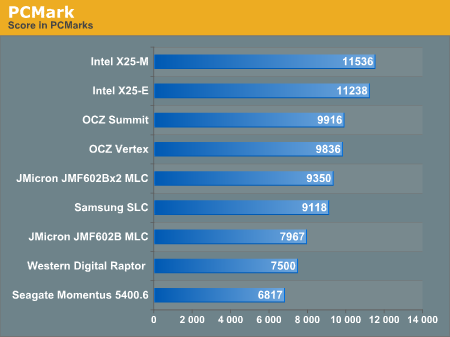
If you've paid attention to the synthetic tests from the previous pages, the results here should make sense. The Intel drives take the top two spots followed by the two OCZ drives, then the JMicron and conventional HDDs take up the rear.
While PCMark does do a great job of measuring disk performance, it doesn't seem to stress random write performance as much, allowing the JMicron drives to relax a bit.
Now let's look at the individual test suites:
The memories suite includes a test involving importing pictures into Windows Photo Gallery and editing them, a fairly benign task that easily falls into the category of being very influenced by disk performance.
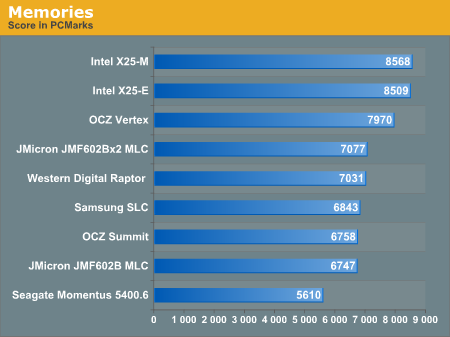
The TV and Movies tests focus on on video transcoding which is mostly CPU bound, but one of the tests involves Windows Media Center which tends to be disk bound.
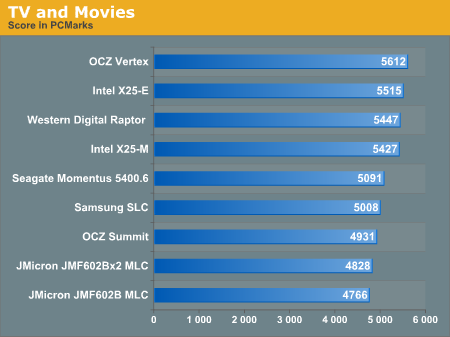
SSDs won't always dominate and in many cases they won't offer tangible improvements over a fast hard drive.
The gaming tests are very well suited to SSDs since they spend a good portion of their time focusing on reading textures and loading level data. All of the SSDs dominate here, but as you'll see later on in my gaming tests the benefits of an SSD really vary depending on the game. Take these results as a best case scenario of what can happen, not the norm.
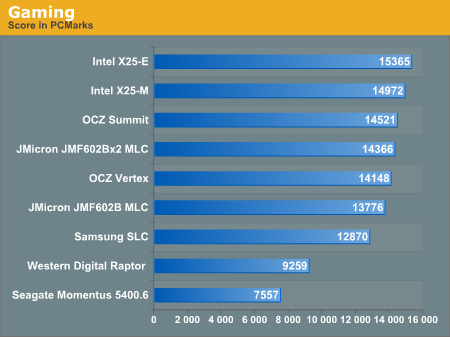
In the Music suite the main test is a multitasking scenario: the test simulates surfing the web in IE7, transcoding an audio file and adding music to Windows Media Player (the most disk intensive portion of the test).
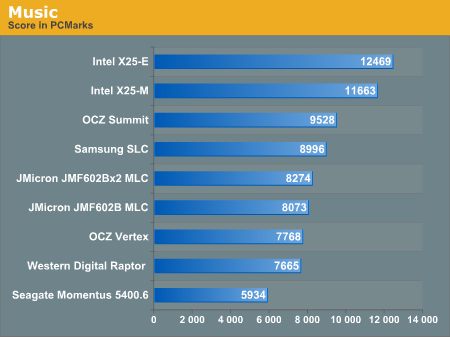
The Communications suite is made up of two tests, both involving light multitasking. The first test simulates data encryption/decryption while running message rules in Windows Mail. The second test simulates web surfing (including opening/closing tabs) in IE7, data decryption and running Windows Defender.

I love PCMark's Productivity test; in this test there are four tasks going on at once, searching through Windows contacts, searching through Windows Mail, browsing multiple webpages in IE7 and loading applications. This is as real world of a scenario as you get and it happens to be representative of one of the most frustrating HDD usage models - trying to do multiple things at once. There's nothing more annoying than trying to launch a simple application while you're doing other things in the background and have the load take seemingly forever.
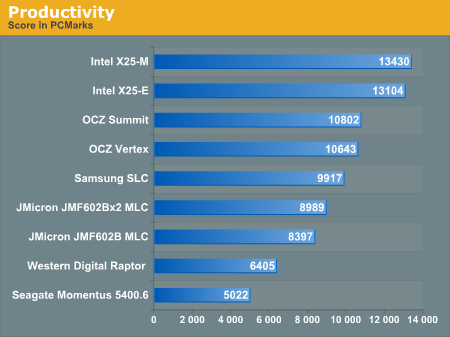
The results here are the best characterization of my personal experience with the drives. The Intel drives are the fastest, a good 25% faster than the Summit or Vertex. Next up are the OCZ drives, with the Vertex dangerously close to the Summit. The older Samsung SLC is next in the standings, followed by the JMicron drives. There's a healthy combination of reads and writes going on here which benefits all of the SSDs, including the less desirable ones.
The final PCMark Vantage suite is HDD specific and this is where you'll see the biggest differences between the drives:
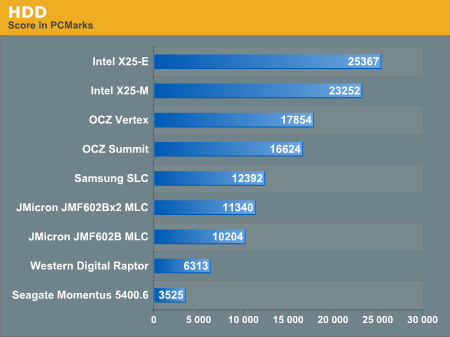
Again we're seeing the sort of breakdown we'd expect. The Intel drives come out ahead, while the Vertex is the best bang for your buck.










250 Comments
View All Comments
zdzichu - Sunday, March 22, 2009 - link
Very nice and thorough article. I only lack more current status of TRIM command support in current operating systems. For example, Linux supports it since last year:http://kernelnewbies.org/Linux_2_6_28#head-a1a9591...">http://kernelnewbies.org/Linux_2_6_28#h...a9591f48...
Sinned - Sunday, March 22, 2009 - link
Outstanding article that really helped me understand SSD drives. I wonder how much of an impact the new SATA III standard will have on SSD drives? I believe we are still at the beginning stage for SSD drives and your article shows that much more work needs to be done. My respect for OCZ and how they responded in a positive and productive way should be a model for the rest of the SSD makers. Thank you again for such a concise article.Respectfully,
Sinned
529th - Sunday, March 22, 2009 - link
The first thing I thought of was Democracy. Don't know why. Maybe it was because a company listened to our common goal of performance. Thank you OCZ for listening, I'm sure it will pay off!!!araczynski - Saturday, March 21, 2009 - link
very nice read. the 4/512 issue seems a rather stupid design decision, or perhaps more likely a stupid problem to find this 4/512 solution as 'acceptable'.although a great marketing choice, built in automatic life expectancy reduction.
sounds like the manufacturers want the hard drives to become a disposable medium like styrofoam cups.
perhaps when they narrow the disparity down to 4/16, i might consider buying an ssd. that, or when they beat the 'old school' physical platters in price.
until then, get back to the drawing board and stop crapping out these half arsed 'should be good enough' solutions.
IntelUser2000 - Sunday, March 22, 2009 - link
araczynski: The 4/512 isn't done by accident. It's done to lower prices. The flash technology used in SSDs are meant to replace platter HDDs in the future. There's no way of doing that without cost reductions like these. Even with that the SSDs still cost several times more per storage space.araczynski - Tuesday, March 24, 2009 - link
i understand that, but i don't remember original hard drives being released and being slower than the floppy drives they were replacing.this is part of the 'release beta' products mentality and make the consumer pay for further development.
the 5.25" floppy was better than the huge floppy in all respects when it was released. the 3.5" floppy was better than the 5.25" floppy when it was released. the usb flash drives were better than the 3.5" floppies when they were released.
i just hate the way this is being played out at the consumer's expense.
hellcats - Saturday, March 21, 2009 - link
Anand,What a great article. I usually have to skip forwards when things bog down, but they never did with this long, but very informative article. Your focus on what matters to users is why I always check anandtech first thing every morning.
juraj - Saturday, March 21, 2009 - link
I'm curious what capacity is the OCZ Vertex drive reviewed. Is it an 120 / 250g drive or supposedly slower 30 / 60g one?Symbolics - Friday, March 20, 2009 - link
The method for generating "used" drives is flawed. For creating a true used drive, the spare blocks must be filled as well. Since this was not done, the results are biased towards the Intel drives with their generous amount of spare blocks that were *not* exhausted when producing the used state. An additional bias is introduced by the reduction of the IOmeter write test to 8 GB only. Perhaps there are enough spare blocks on the Intel drives so that these 8 GB can be written to "fresh" blocks without the need for (time-consuming) erase operations.Apart from these concerns, I enjoyed reading the article.
unknownError - Saturday, March 21, 2009 - link
I also just created an account to post, very nice article!Lots of good well thought out information, I'm so tired of synthetic benchmarks glad someone goes through the trouble to bench these things right (and appears to have the education to really understand them). Whats with the grammar police though? geez...